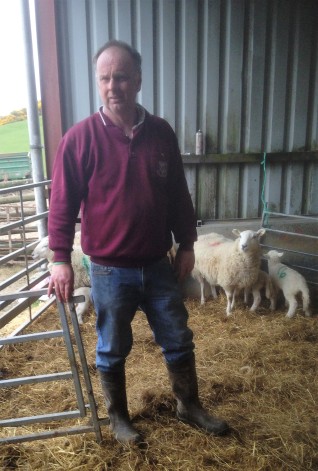This article by Jane Powell was first published in the Cambrian News
When NFU Cymru Livestock Board chairman Wyn Evans was growing up, his grandparents’ upland farm near Aberystwyth was a model of self-sufficiency. They grew grain, hay and green fodder for their animals, just buying in a little extra feed for a milking herd of 20-25 cows, and sent their small flock of sheep up the hill to graze in the summer. The land supported four people working full-time on a wide variety of tasks and produced milk, beef, lamb and potatoes for local consumption.

Wyn Evans on his farm
It’s a way of farming that has vanished. Speaking at February’s Let’s Talk About Food event in Aberystwyth, Wyn described how he and his wife combined that farm with other land they bought and now keep sheep and beef cattle on 230 acres, sending lambs to the abattoir in Llanidloes and on to Sainsbury’s, while the calves go to other farmers for fattening. He employs only a little part-time labour.
“The main change has been the grip of the retailers,” he explains. “We love to do our shopping in one place, and so we go to supermarkets. But that way, beef and sheep farmers get on average less than the cost of production, and depend on subsidies.” With Brexit, Welsh farming is at a crossroads: it will either move to very large-scale farming to stay competitive, or with government support, strong domestic sales and access to the EU market, family farms might stay in business.
All this might be seen as simply a problem for farmers to sort out, but the public are involved too. The countryside, its wildlife, its soils, its amenities and of course its capacity to produce food are of concern to all of us. Now is a crucial time for food producers and the public to come together and ask what food system we want to see, and that was the bigger question at February’s event, organized by the Aberystwyth Food Forum with support from Ceredigion Council’s Cynnal y Cardi programme.
LOOKING FOR LOCAL ALTERNATIVES
The Forum was set up last year to see how everything to do with food in our area can be developed and celebrated for the good of all. Members include Aber Food Surplus, who redistribute supermarket surplus to charities, and Penglais Community Garden, and it holds regular Pay-As-You-Feel meals in cafes and community centres in town, bringing people together for discussion.
We want to ask questions about where our food comes from. The supermarkets are not the only show in town. The Treehouse buys direct from many local organic and low-input producers, selling vegetables, fruit, meat and dairy in its shop and café, and there are several excellent family butchers selling local meat. The twice-monthly farmers’ market is thriving, and many eateries boast local produce on their menus.
Perhaps Brexit is an opportunity. “I would support any outlet for agricultural produce,” said Wyn. “Let’s educate people – they don’t have to go to the supermarkets. There are other choices.”
Jane Powell is a freelance educator and writer active in local food matters in Aberystwyth. She writes here and on her own site, www.foodsociety.wales
Reblogged this on Alexanders' Blog.
LikeLike